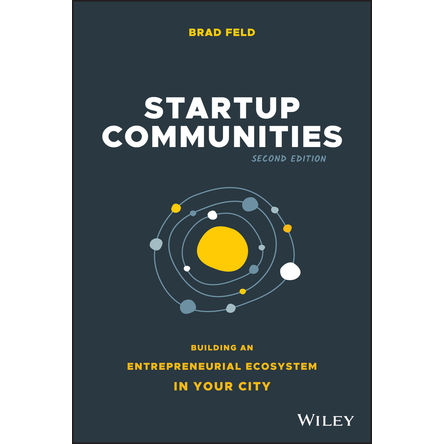Description
“Startup communities” are popping up everywhere, in cities like Boulder and Boston and even in rural areas like Carbondale, CO. These networks of people and organizations are driving innovation, small business growth, and local economic development.
Now in its second edition, Startup Communities, Building an Entrepreneurial Ecosystem in Your City provides a framework and tools to create and enhance a startup community in virtually any city.
Based on more than twenty years of experience in Boulder, CO, as well as contributions from other innovative startup communities, this important book will help you understand:
- The core principles of a vibrant startup community
- The attributes of leadership in a startup community that can help it thrive along with the classic problems any community will face during development
- The importance of a university in a startup community
- How large companies can engage effectively with entrepreneurs.
- The importance of continuous improvement so growth does not stagnate
- The common myths about startup communities
- The opportunities to build startup communities in non-urban, or rural, places that are much less populated.
Table of Contents
1. Introduction
- The Example of Boulder
- How This Book Works
2. The Boulder Startup Community
- Boulder as a Laboratory
- Before the Internet (1970–1994)
- Pre-Internet Bubble (1995–2000)
- The Collapse of the Internet Bubble (2001–2002)
- The Beginning of the Next Wave (2003–2011)
- An Outsider’s View of Boulder in 2012
- The Next Wave (2012–2020)
3. Principles of a Vibrant Startup Community
- Historical Frameworks
- The Boulder Thesis
- Led by Entrepreneurs
- Long-Term Commitment
- Foster a Philosophy of Inclusiveness
- Engage the Entire Entrepreneurial Stack
4. Participants in a Startup Community
- Entrepreneurs
- Government
- Universities
- Investors
- Mentors
- Service Providers
- Large Companies
- The Importance of Leaders, Feeders, and Instigators
5. Attributes of Leadership in a Startup Community
- Be Inclusive
- Play a Non-Zero-Sum or Positive-Sum Game
- Be Mentorship Driven
- Have Porous Boundaries
- Give People Assignments
- Experiment and Fail Fast
6. Classic Problems
- The Patriarch Problem
- Complaining About Capital
- Being Too Reliant on Government
- Making Short-Term Commitments
- Having a Bias Against Newcomers
- Attempt by a Feeder to Control the Community
- Creating Artificial Geographic Boundaries
- Playing a Zero-Sum Game
- Having a Culture of Risk Aversion
- Avoiding People Because of Past Failures
7. Activities and Events
- Young Entrepreneurs Organization
- Office Hours
- Boulder Denver New Tech Meetup
- Boulder Open Coffee Club
- Startup Weekend
- Ignite Boulder
- Boulder Beta
- Boulder Startup Digest
- CU New Venture Challenge
- Entrepreneurs Foundation of Colorado
8. The Power of Accelerators
- The Spread of Techstars to Boston and Seattle
- Techstars Expands to New York
- Techstars Today
- Accelerators Are Different than Incubators
- University Accelerators
9. University Involvement
- Silicon Flatirons’ Networked Approach
- Organizing the Components of University Entrepreneurship
- Other Campus Initiatives That Affect Startup Communities
- The Real Value—Fresh Blood into the System
- Challenges and Responses for University
- Entrepreneurship Programs
- The Power of Alumni
10. Contrasts between Entrepreneurs and Government
- Self-Aware versus Not Self-Aware
- Bottom Up versus Top Down
- Micro versus Macro
- Action versus Policy
- Impact versus Control
11. How Large Corporations Can Help
- Start by Linking to Corporate Innovation Initiatives
- Support, Convene, Consume, and Engage
- Self-interest is Good
- Think About Talent Appropriately
- Reinvestment in Your Community
12. The Power of the Community
- Give Before You Get (#GiveFirst)
- Everyone is a Mentor
- Embrace Weirdness
- Be Open to Any Idea
- Be Honest
- Go for a Walk
- The Value and Cost of an After-Party
13. Broadening a Successful Startup Community
- Parallel Universes
- Integration with the Rest of Colorado
- Lack of Diversity
- Physical Space
14. Rural Startup Communities
- Definition of a Rural Startup Community
- A Broader Definition of Entrepreneurship
- Entrepreneurs Before Capital
- Beyond Traditional Capital Models
- Rural + Urban, Not Rural versus Urban
15. Myths about Startup Communities
- We Need to Be Like Silicon Valley
- We Need More Local Venture Capital
- Angel Investors Must Be Organized
16. Getting Started
- Getting Startup Iceland Started
- Big Omaha
- Startup America Partnership
- Do or Do Not, There is No Try
- About the author
Acknowledgments
Foreword—First edition (2012)
Index
About the Author
Brad Feld has been an early-stage investor and entrepreneur for over 30 years. He is currently a partner at Foundry Group and is a co-founder of Techstars.
Startup Communities documents the buzz, strategy, long-term perspective, and dynamics of building communities of entrepreneurs who can feed off of each other’s talent, creativity, and support.



